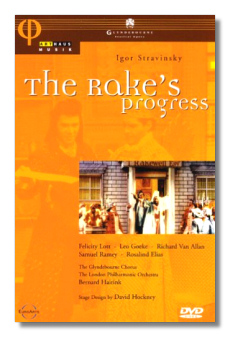
The Internet's Premier Classical Music Source
Related Links
- Stravinsky Reviews
- Latest Reviews
- More Reviews
-
By Composer
-
Collections
DVD & Blu-ray
Books
Concert Reviews
Articles/Interviews
Software
Audio
Search Amazon
Recommended Links
Site News
 DVD Review
DVD Review
Igor Stravinsky

The Rake's Progress
- Leo Goeke (Tom Rakewell)
- Felicity Lott (Anne Trulove)
- Samuel Ramey (Nick Shadow)
- Richard Van Allan (Trulove)
- Rosalind Elias (Baba the Turk)
- Nuala Willis (Mother Goose)
- John Fryatt (Sellem)
- Thomas Lawlor (Keeper of the Madhouse)
Glyndebourne Festival Chorus
London Philharmonic Orchestra/Bernard Haitink
Arthaus Musik DVD 101093 146min Full Frame 1:33 LPCM Stereo
With a libretto by W.H. Auden and Chester Kallman, The Rake's Progress is among the most literate of operas. It is based on a series of copper engravings by William Hogarth, but Auden and Kallman, with Stravinsky, used them only as a point of departure, and the result is a morality play as relevant in the 21st century as it was in the 1730s. Tom Rakewell, apparently a decent enough fellow, is all too easily led astray by money and the Mephistophelean Nick Shadow. From the start, Tom is not the most intelligent or industrious of humans. Still, it is not difficult for most of us to imagine falling into similar traps. The libretto and the music (which represents the apex of Stravinsky's neoclassical style) are clever indeed. If anything, they are too clever, because while one is quickly fascinated by The Rake's Progress, deep emotions are not conveyed to the audience. It is telling that Anne Trulove, the pure heroine who is faithful to Tom through all, is not a particularly interesting character. Stravinsky almost makes her into a parody of a classical heroine. Is this any way to treat a lady? In spite of this, The Rake's Progress is essential fare for those who wish to be familiar with the great operas of the past century. One might even call it diabolically fun.
This DVD preserves the famous Glyndebourne Festival Opera production of 1975. The design is by David Hockney, who has done The Rake's Progress in the style of Hogarth on LSD. The busy sets and even the costumes are cross-hatched as if they were engravings (which will create a "shimmering" effect on screen for some home viewers), and Hockney has added liberal splashes of pastel colors. In the Bedlam scene, Hockney places the chorus in what looks like partitioned jury boxes across the back of the stage - an interesting effect. On the whole, Hockney extends the distancing of the action from the observers that originated with the librettists and the composer.
Stravinsky abhorred writing vocal lines which go in the directions one expects them to, and this presents a challenge to singers. The challenge is met and conquered with bravado in this production. Ramey, at the beginning of his career, is a persuasive Nick Shadow, and he can condense utter malevolence into a single glance or facial expression. Goeke, is the personification of youthful innocence perverted; one cannot help feeling sorry for Tom, stupid or thoughtless as he might be. Lott brings lyric-coloratura sweetness to Anne. As the bearded Baba, veteran Elias (a great Carmen in her day) brings a still-fabulous voice and comic skill to this production. The smaller roles are excellently cast, and the chorus does no small part to add to the color and wit onstage. Haitink conducts with uncharacteristic point and energy.
Even though it is three decades old, the sound and video quality show few signs of age. The camera is not afraid to zoom in for singer close-ups, which adds to the immediacy of this production. (It probably looked chillier at Glyndebourne than it looks on TV.) All in all, this DVD is a very entertaining way to spend two and a half hours. My respect for this opera has increased greatly as a result of watching it.
Copyright © 2005, Raymond Tuttle



















